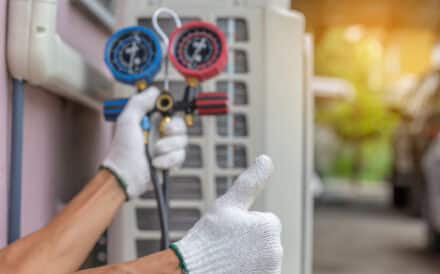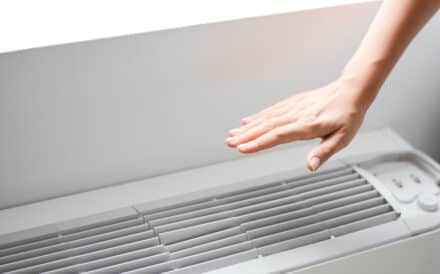DIY AC Troubleshooting vs. Professional Repair: What You Should Know
It’s a hot and humid summer afternoon, and suddenly, your air conditioner starts blowing warm air—or worse, stops working altogether. Now you’re weighing whether to roll up your sleeves and attempt a DIY fix or call in the professionals for residential AC repair. While the DIY route is tempting (and we love a good home improvement project!), knowing when to tackle an AC issue yourself versus when to bring in the experts can save you time, money, and potential headaches later on. Here’s everything you need to know.
The Hidden Risks of DIY AC Repairs
Before you start queuing up DIY repair videos on YouTube, there are some important reasons why attempting to perform residential AC repair yourself might not be the wisest choice.
Health & Safety Risks
Working on an AC system presents a number of safety hazards that should be taken seriously. Simply handling the wrong wire could cause a fire or give you an electrical shock. Similarly, mishandling refrigerant can cause leaks that release dangerous fumes into your home. But the safety concerns can extend beyond just your initial residential AC repair attempt.
Even if you manage to get your AC running again, DIY repairs can spark long-term safety issues. Without professional training and experience, you might accidentally use inferior materials or follow incorrect repair instructions. And these mistakes can surface weeks or months later, potentially causing system failures or safety hazards. What’s more, the lack of proper tools and safety equipment puts you at risk during the repair process itself, especially when it comes to handling and disposing of hazardous materials like refrigerants, which require specialized equipment and certification to manage safely.
Extended Repair Time
Think your residential AC repair will be a quick afternoon project? We hate to break it to you, but even our experienced technicians sometimes spend hours diagnosing a single AC issue. These systems are like intricate puzzles, with dozens of interconnected parts that could be causing your problem. Tackling it yourself means countless hours watching videos, researching symptoms, and testing different solutions—all while your home gets warmer and more uncomfortable.
And here’s the kicker: if you accidentally fix the wrong thing or damage another component in the process (which happens more often than you’d expect), you’ve just turned a one-day project into a multi-day ordeal. What started as a strange noise or weak airflow could snowball into a much larger headache, ultimately leading to that emergency repair call you were trying to avoid in the first place. Meanwhile, your family is stuck sweating it out during the hottest part of summer.
Potentially Higher Costs
Many homeowners turn to DIY repairs in the hopes of saving money, but all too often this backfires. Reputable HVAC techs are equipped with all the tools and diagnostic equipment needed—items that would cost you hundreds (even thousands) of dollars to purchase for a one-time repair. Add to that the cost of parts, which professionals can often source at a better price, and you’re looking at a fairly hefty bill.
And if you misdiagnose the problem or make a mistake during repairs? Now you’re not only going to pay for the residential AC repair you needed in the first place, you’re also going to pay for the cost of fixing any additional damage you may have caused. The bill adds up quickly. For homes with integrated HVAC systems, there’s also the risk of causing damage to your heating components, turning a simple AC repair into a much more expensive whole-system problem.
Violating Your Warranty
Many homeowners don’t realize this until it’s too late: attempting DIY repairs on their air conditioners can void their manufacturer’s warranty. Most warranties specifically require professional maintenance and repairs to remain valid. By trying to fix things yourself, you’re not just risking the current repair. You’re potentially losing coverage for any future issues that might arise.
Safe DIY Maintenance for Your AC System
While we’ve covered why complex repairs should be left to the professionals, there are some important maintenance tasks you can—and should—handle yourself. Regular upkeep will help your AC run more efficiently and expand the lifespan of your unit.
For instance, regular filter replacement is important as your AC’s air filter is its first line of defense. When dust and debris build up in your filter, your system has to work harder to push air through, which can lead to higher energy bills and unnecessary strain on your equipment. We recommend checking your filter monthly and replacing it every three months—or more frequently if you have pets, live in a dusty area, or run your AC constantly during the summer months. It’s a simple task that takes just a few minutes but can add years to your system’s life and keep your energy bills in check.
Trust Silver State for Your Residential AC Repairs
At Silver State, we believe in empowering homeowners with knowledge while ensuring your cooling system stays in peak condition. Whether you’re dealing with strange noises from your unit or inconsistent cooling, understanding the value of professional repair can help you make the best decision for your home and your family’s comfort.
Don’t let AC troubles leave you sweating on a hot summer day. Contact Silver State 24/7 for residential AC repair at (702) 763-9451 or click the “Book Now” button at the top of this page to schedule your service.



